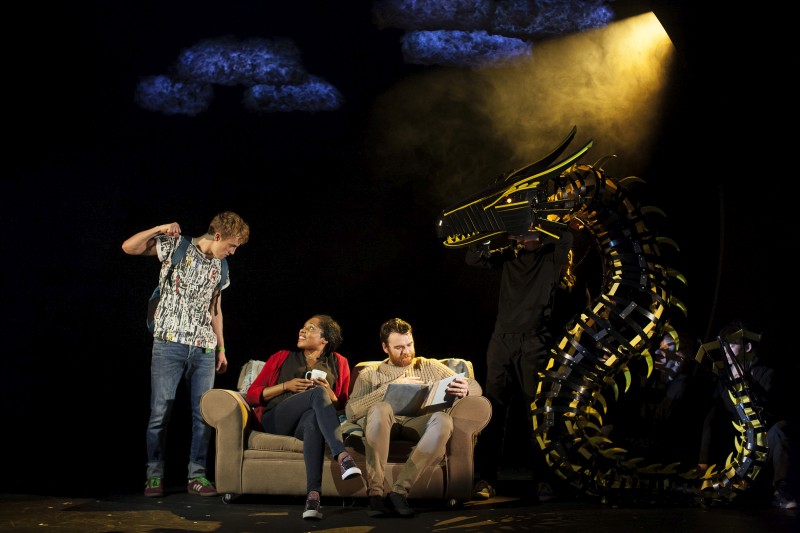 On taking your seat you’re immediately struck by the image on stage – a series of concentric circles shape the black space, framing the suggestion of a city in the distance. A series of amazing-looking clouds hang in rows coming from the back to the front. There’s a sense both of familiarity and magic. Of course, the show opens with a hint of lightning in the clouds.
On taking your seat you’re immediately struck by the image on stage – a series of concentric circles shape the black space, framing the suggestion of a city in the distance. A series of amazing-looking clouds hang in rows coming from the back to the front. There’s a sense both of familiarity and magic. Of course, the show opens with a hint of lightning in the clouds.
This wordless physical theatre tells the story of a boy who is on the cusp of adulthood but must deal with that most adult of emotions, grief. The ensemble of performers create all the stage effects, creating and transforming the scenes with impressive precision: the boy’s bed revolves and suddenly it’s a hospital bed and he’s saying goodbye to his mother. He looks out of the window of his room and the lamp-post seems to turn into a dragon. His father is overcome with grief and the simple wooden chair is gone, a wooden dragon breathing in its place. Vox Motus count stage magic amongst their box of tricks and powerful theatrical illusion is achieved to great effect here,
The music by Tim Phillips matches the power of the visual storytelling well. Simon Wilkinson’s lighting is flawless and the magnificent series of dragon puppets, each more impressive than the last, are beautifully manipulated by the ensemble. The emotional heart of this piece is well captured throughout by the rich and strange symbolism of the dragons, each of which is beautifully designed to emerge from the boy’s world, reflecting the material qualities of the environment he is in at any given moment,
This is a powerful graphic novel as a piece of visual theatre, and could happily travel the world to all audiences between 11 and 19 years old. Created in collaboration with the Tianjin Children’s Art Theatre, the dragons are Chinese dragons – very fluid, almost serpent-like and full of ancient power and wisdom. The story told by the performance is clear and clean: a boy learns to overcome his grief before it overwhelms him, accepts the change in his life with the help of his dragons.
The lack of language is mostly clear and effective, but occasionally in one or two scenes it’s hard to understand why the performers don’t speak. In the programme notes the writer Oliver Emmanuel says that it’s possible for the boy to have lost the power of speech through trauma, but his father, his sister, and his father’s friend all are capable of speech and it’s hard to accept that they don’t. Yet the few words uttered in the final minutes win us over in a touching resolution.
